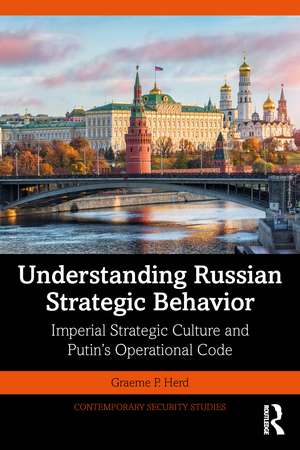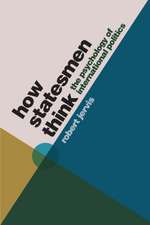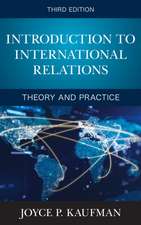Understanding Russian Strategic Behavior: Imperial Strategic Culture and Putin’s Operational Code: Contemporary Security Studies
Autor Graeme P. Herden Limba Engleză Paperback – 28 ian 2022
| Toate formatele și edițiile | Preț | Express |
|---|---|---|
| Paperback (1) | 287.94 lei 22-36 zile | +19.56 lei 5-11 zile |
| Taylor & Francis – 28 ian 2022 | 287.94 lei 22-36 zile | +19.56 lei 5-11 zile |
| Hardback (1) | 1003.43 lei 43-57 zile | |
| Taylor & Francis – 28 ian 2022 | 1003.43 lei 43-57 zile |
Din seria Contemporary Security Studies
-
 Preț: 312.00 lei
Preț: 312.00 lei -
 Preț: 348.39 lei
Preț: 348.39 lei - 9%
 Preț: 934.94 lei
Preț: 934.94 lei - 18%
 Preț: 1222.16 lei
Preț: 1222.16 lei - 18%
 Preț: 1227.03 lei
Preț: 1227.03 lei -
 Preț: 458.20 lei
Preț: 458.20 lei - 18%
 Preț: 1108.42 lei
Preț: 1108.42 lei - 16%
 Preț: 248.97 lei
Preț: 248.97 lei - 18%
 Preț: 1218.89 lei
Preț: 1218.89 lei - 18%
 Preț: 1058.79 lei
Preț: 1058.79 lei -
 Preț: 498.48 lei
Preț: 498.48 lei - 26%
 Preț: 1016.77 lei
Preț: 1016.77 lei - 18%
 Preț: 1062.98 lei
Preț: 1062.98 lei - 18%
 Preț: 1010.05 lei
Preț: 1010.05 lei - 18%
 Preț: 1054.97 lei
Preț: 1054.97 lei -
 Preț: 399.79 lei
Preț: 399.79 lei - 18%
 Preț: 1114.30 lei
Preț: 1114.30 lei - 18%
 Preț: 1113.25 lei
Preț: 1113.25 lei - 18%
 Preț: 1221.26 lei
Preț: 1221.26 lei - 18%
 Preț: 1059.84 lei
Preț: 1059.84 lei - 18%
 Preț: 707.96 lei
Preț: 707.96 lei - 18%
 Preț: 1055.84 lei
Preț: 1055.84 lei - 26%
 Preț: 821.10 lei
Preț: 821.10 lei - 18%
 Preț: 1061.06 lei
Preț: 1061.06 lei - 18%
 Preț: 1229.46 lei
Preț: 1229.46 lei -
 Preț: 385.54 lei
Preț: 385.54 lei - 18%
 Preț: 946.61 lei
Preț: 946.61 lei - 18%
 Preț: 1271.75 lei
Preț: 1271.75 lei - 18%
 Preț: 1057.57 lei
Preț: 1057.57 lei -
 Preț: 416.22 lei
Preț: 416.22 lei -
 Preț: 437.71 lei
Preț: 437.71 lei - 18%
 Preț: 1054.71 lei
Preț: 1054.71 lei -
 Preț: 409.31 lei
Preț: 409.31 lei - 18%
 Preț: 1170.14 lei
Preț: 1170.14 lei - 26%
 Preț: 849.84 lei
Preț: 849.84 lei - 18%
 Preț: 702.40 lei
Preț: 702.40 lei -
 Preț: 414.32 lei
Preț: 414.32 lei - 18%
 Preț: 1059.93 lei
Preț: 1059.93 lei - 18%
 Preț: 1061.93 lei
Preț: 1061.93 lei - 18%
 Preț: 1163.88 lei
Preț: 1163.88 lei - 18%
 Preț: 1002.68 lei
Preț: 1002.68 lei - 18%
 Preț: 694.94 lei
Preț: 694.94 lei - 25%
 Preț: 823.63 lei
Preț: 823.63 lei - 18%
 Preț: 939.79 lei
Preț: 939.79 lei - 18%
 Preț: 1057.89 lei
Preț: 1057.89 lei
Preț: 287.94 lei
Nou
55.10€ • 57.67$ • 45.86£
Carte disponibilă
Livrare economică 10-24 martie
Livrare express 21-27 februarie pentru 29.55 lei
Specificații
ISBN-10: 036720522X
Pagini: 262
Ilustrații: 4 Tables, black and white
Dimensiuni: 156 x 234 x 15 mm
Greutate: 0.37 kg
Ediția:1
Editura: Taylor & Francis
Colecția Routledge
Seria Contemporary Security Studies
Locul publicării:Oxford, United Kingdom
Public țintă
Postgraduate, Professional, and UndergraduateNotă biografică
Cuprins
Recenzii
'Is Putin's Russia something new and distinctive, or the inevitable product of Russia's history? As this densely-argued and conceptually-rich book argues, to understand tomorrow's decisions, we need to place them not just within the context of the operational code of today's leaders, but a strategic culture that has been forming for centuries.'--Mark Galeotti, University College London, UK
‘This fascinating book offers a timely and comprehensive scholarly investigation of the historical and cultural roots of contemporary Russian foreign policy. Prof. Herd provides the most detailed and informed analysis to date of the many strands and themes in Russian strategic culture, and demonstrates how these long-standing beliefs and norms continue to shape Russian foreign policy today.'--David Lewis, University of Exeter, UK
'Understanding Russian Strategic Behavior: Imperial Strategic Culture and Putin’s Operational Code is a masterstroke from Herd – it manages to ‘solve’ Churchill’s ‘Russia riddle’. Blending various aspects of Putin’s Russia into a wide ranging and clever text, Herd meticulously plots the drivers of Russian strategy and behavior under Vladimir Putin. Herd diligently incorporates contemporary strategic affairs into the text and in analyzing Kremlin responses, the book imparts on the reader a clear understanding of how and why Putin’s Russia operates. Engaging and accessible, the book will be of interest to Russianists (new and old hand) across all stages of academia, various government agencies and even the private sector. Herd’s book will no doubt assist those seeking to navigate the complex world of Russian strategic behavior. This book is a crucial guide understanding a key stakeholder in the international security environment and indeed, a significant shaper of strategic competition yet to come.'--Elizabeth Buchanan, Australian War College, Canberra and Fellow of Modern War Institute, West Point, USA
'An excellent examination of the reasons why North American, the EU and Britain are stuck in a strategic confrontation with Russia. Russian strategic culture, as Herd convincingly shows, has seen many changes from the Czarist times to the present. Under Putin, however, the ruling elite had defined Russia’s strategic interests and values as incompatible with those of the West. This has created "a new normal" that has made it difficult to find a way out of what essentially is a dead end.'− Hannes Adomeit, Senior Fellow, Institute for Security Studies at Kiel University (ISPK), Gemany
Descriere
This book examines the extent to which Russia's strategic behavior is the product of its imperial strategic culture and Putin's own operational code.
The work argues that, by conflating personalistic regime survival with national security, Putin ensures that contemporary Russian national interest, as expressed through strategic behavior, is the synthesis of a peculiar troika: a long-standing imperial strategic culture, rooted in a partially imagined past; the operational code of a counter-intelligence president and decision-making elite; and the realities of Russia as a hybrid state. The book first examines the role of structure and agency in shaping contemporary Russian strategic behavior. It then provides a conceptual understanding of strategic culture, and applies this to Tsarist and Soviet historical developments. The book's analysis of the operational code, however, demonstrates that Putinism is more than the sum of the past. Finally, the book assesses Putin's statecraft and stress-tests our assumptions about the exercise of contemporary power in Russia and the structure of Putin's agency.
This book will be of interest to students of Russian politics and foreign policy, strategic studies and International Relations.


